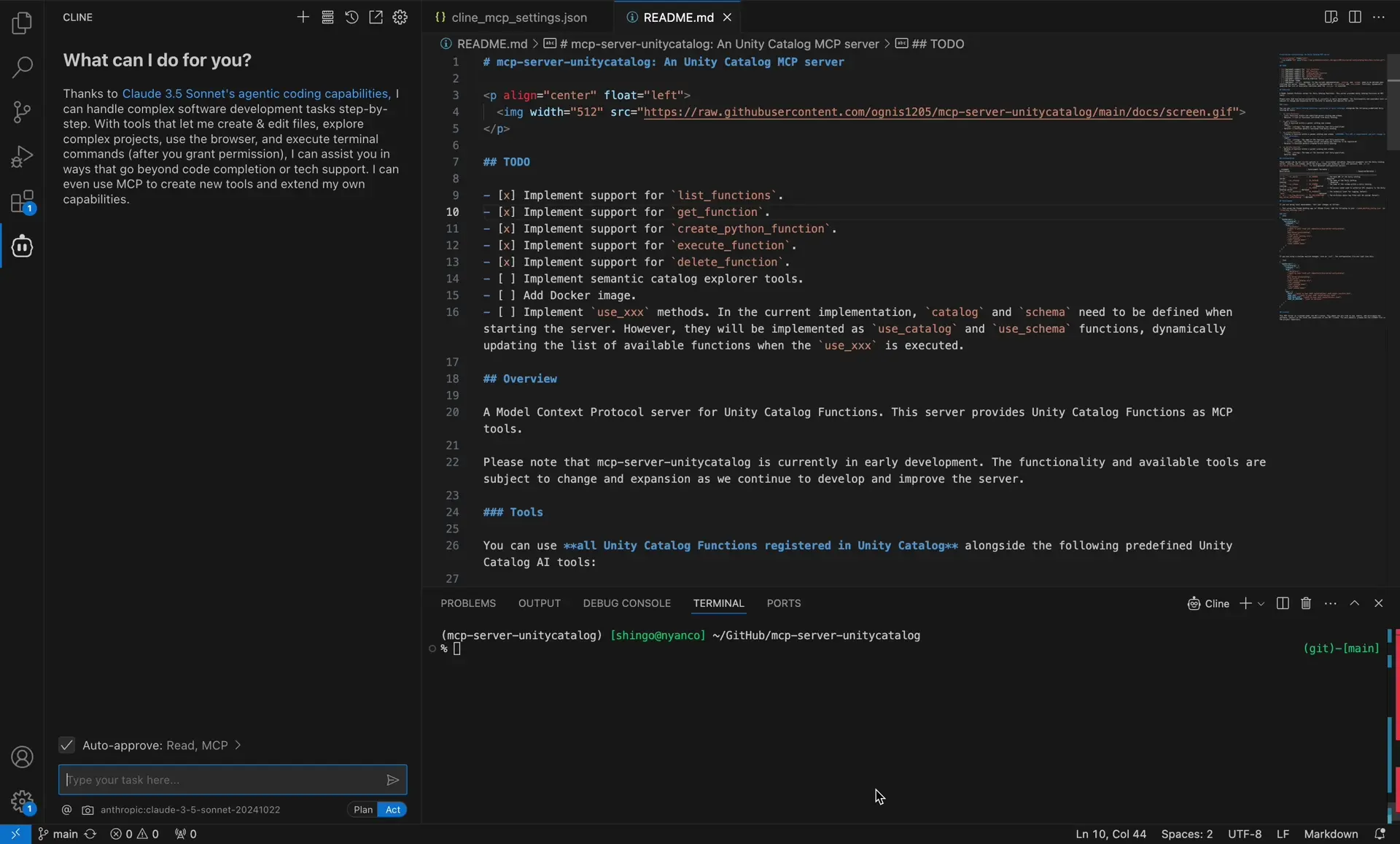Mcp Server Unitycatalog: An Unity Catalog Mcp Server
Unity Catalog AI Model Context Protocol Server
Overview
What is MCP Server Unity Catalog?
The ### MCP Server Unity Catalog is a powerful server solution designed to manage and serve AI model context protocols. It provides a centralized platform for organizing, storing, and retrieving data related to AI models, ensuring that developers and data scientists can efficiently access the information they need to build and deploy AI applications.
Features of MCP Server Unity Catalog
- Centralized Data Management: The Unity Catalog allows users to manage all AI model data in one place, simplifying data retrieval and organization.
- Enhanced Collaboration: Multiple users can access and contribute to the catalog, fostering collaboration among teams working on AI projects.
- Version Control: The server supports versioning of AI models, enabling users to track changes and revert to previous versions if necessary.
- User-Friendly Interface: The intuitive interface makes it easy for users to navigate through the catalog and find the information they need quickly.
- Security and Compliance: The MCP Server ensures that all data is stored securely and complies with relevant data protection regulations.
How to Use MCP Server Unity Catalog
- Installation: Begin by downloading the MCP Server Unity Catalog from the official repository. Follow the installation instructions provided in the documentation.
- Configuration: After installation, configure the server settings to suit your project requirements. This includes setting up user permissions and data storage options.
- Data Upload: Upload your AI model data to the catalog. You can organize the data into categories for easier access.
- Accessing Data: Use the search functionality to quickly find specific models or datasets. The catalog allows filtering by various criteria to streamline the search process.
- Collaboration: Invite team members to access the catalog and collaborate on projects. Utilize the version control feature to manage changes effectively.
Frequently Asked Questions
What types of data can be stored in the MCP Server Unity Catalog?
The catalog can store various types of data related to AI models, including model parameters, training datasets, evaluation metrics, and documentation.
Is the MCP Server Unity Catalog open-source?
Yes, the MCP Server Unity Catalog is an open-source project, allowing users to contribute to its development and customize it for their needs.
How do I contribute to the MCP Server Unity Catalog?
You can contribute by forking the repository, making your changes, and submitting a pull request. Ensure to follow the contribution guidelines outlined in the repository.
Can I integrate the MCP Server Unity Catalog with other tools?
Yes, the catalog is designed to be flexible and can be integrated with various data science and machine learning tools to enhance your workflow.
What support is available for users of the MCP Server Unity Catalog?
Users can access community support through forums and GitHub discussions. Additionally, documentation is provided to assist with setup and troubleshooting.
By leveraging the MCP Server Unity Catalog, teams can streamline their AI development processes, enhance collaboration, and ensure efficient data management.
Details
Server Config
{
"mcpServers": {
"mcp-server-unitycatalog": {
"command": "docker",
"args": [
"run",
"-i",
"--rm",
"ghcr.io/metorial/mcp-container--ognis1205--mcp-server-unitycatalog--mcp-server-unitycatalog",
"mcp-server-unitycatalog --uc_server uc-server --uc_catalog uc-catalog --uc_schema uc-schema"
],
"env": {}
}
}
}